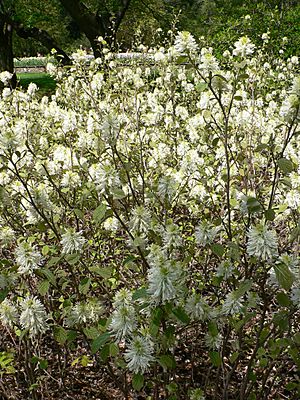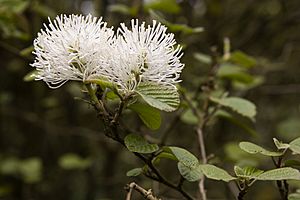Witch alder facts for kids
Quick facts for kids Witch alder |
|
|---|---|
 |
|
| Fothergilla gardenii | |
| Scientific classification |
|
| Kingdom: | Plantae |
| Clade: | Tracheophytes |
| Clade: | Angiosperms |
| Clade: | Eudicots |
| Order: | Saxifragales |
| Family: | Hamamelidaceae |
| Subfamily: | Hamameloideae |
| Tribe: | Fothergilleae |
| Genus: | Fothergilla Murr. |
| Species | |
|
|
Fothergilla (also called witch alder) is a group of beautiful flowering plants. These plants are deciduous shrubs, meaning they are woody plants that lose their leaves each autumn. They are part of the family called Hamamelidaceae.
You can find Fothergilla plants growing naturally in the woodlands and swamps of the southeastern United States. They usually grow to be about 1 to 3 meters (3 to 10 feet) tall. Their branches have soft, fuzzy twigs.
In the spring, before their leaves even appear, Fothergilla plants produce unique, brush-like flowers. These flowers don't have petals. Instead, they have many white, showy stamens that are about 2 to 3 centimeters long. The leaves are broad and oval-shaped, about 4 to 10 centimeters long. They have edges that look like they've been roughly cut with teeth. In the fall, these leaves turn amazing shades of orange or red, making them very popular.
Types of Fothergilla Plants
There are a few different types, or species, of Fothergilla. Here are the main ones:
- Fothergilla gardenii: This one is known as the dwarf witch alder because it stays smaller.
- †Fothergilla malloryi: This species is now extinct. It lived a very long time ago, during a period called the Ypresian.
- Fothergilla major: This is the large witch alder.
- Fothergilla monticola: Also called the Alabama witch alder. It is often grouped with F. major.
Why is it Called Fothergilla?
The name Fothergilla was chosen to honor a famous English doctor and plant collector. His name was Dr. John Fothergill (1712-1780). He lived in Stratford, Essex, and was well-known for bringing many American plants to Britain.
Growing Fothergilla
People often grow Fothergilla plants in their gardens. They are popular ornamental plants because of their beautiful flowers in spring and their amazing leaf colors in autumn. They grow slowly and usually don't get taller than 1 to 2 meters (3 to 6 feet) in gardens.
There is a special type of Fothergilla called Fothergilla × intermedia 'Mount Airy'. This is a hybrid, meaning it's a mix of two different Fothergilla species. It's so popular that it has won an award called the Royal Horticultural Society's Award of Garden Merit.
See also
 In Spanish: Fothergilla para niños
In Spanish: Fothergilla para niños


